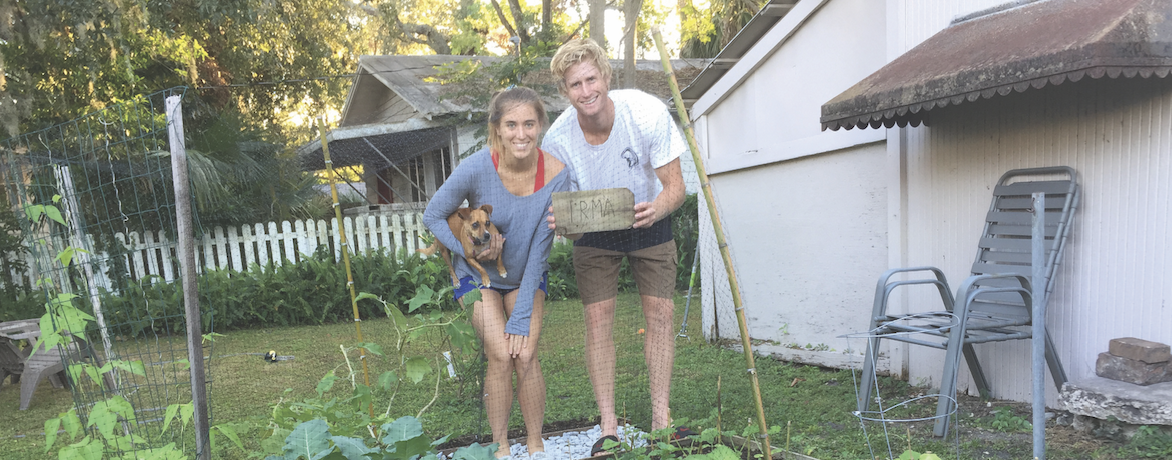In the wake of Hurricane Irma’s destruction, Ari Davis ’18 and Katie Wookey ’18, two Crummer MBA candidates, found a way to repurpose roadside wood into a raised vegetable garden.
Davis and Wookey bike down Holt avenue every morning on their way to Rollins and would always notice the debris left over from the storm. Davis, a sustainable food systems coordinator at East End Market, was inspired to find new life in the destruction.
“Even if you were out of town, you may have noticed the stacks of broken fences piled up on the streets of Holt just waiting to be taken to the landfill,” shared Davis. Whenever he and Wookey biked by the piles, he just kept saying, “Let’s do something.” He emphasized, “It was hard to bike by all that great wood every day without using it for something good.” Finally, they went along Holt and collected wood, some of which is still stored in their garage, and decided to build.
Davis drew inspiration from his job at East End Market, where there is an urban farm. It is a “big working farm in downtown Orlando.” East End Market also features a nearby food outpost on Corrine avenue that has come to be a hub for sustainable development in the city.
Davis and Wookey’s raised garden has been named ‘Irma’ and is now growing tomatoes, cucumbers, zucchini, lettuce, kale, basil, and oregano, according to Davis. Now, their garden is thriving; they even invited their neighbors over for dinner to eat the vegetables, and their neighbors have adopted the idea and now have their own Irma garden.
“Now, Irma is responsible for not just one, but two vegetable gardens in the neighborhood,” said Davis. “This second garden uses re-purposed materials, including broken bamboo shoots to house green beans, as well as parts of old wooden fences.”
With their individual success, they are eager to help others build the vegetable patches as well. Davis said, “We’d love to see a bunch of urban farms [on Holt Avenue].”
Davis commented on the physical and mental benefits of gardening: “There are several links to both physical and mental well-being, not to mention the building of community happiness through vegetable gardens.”
Physical benefits come with getting out in the soil with “natural microbes to help with gut bacteria.” In addition, the physical work brings exercise, and being “out in the sun, you’re getting vitamin D.” Davis even knew of instances of rehabilitation centers helping people heal by “getting out in nature.”
The couple has now helped start five veggie patches now—two from recycled Irma wood. Four of them are raised garden beds, which use bamboo to keep the squirrels out and help the beans grow.
The whole process does not take too long—about an hour and a half once one removes the old grass, spreads the soil, adds the seeds, etc.
In a generous and motivated gesture, Davis said he is willing to install the raised gardens himself. “Call me!” he said. “I have extra supplies in my garage.” As long as you have permission from the landlord, Davis will be happy to help.
If you want to take on this project by yourself, Davis said, “YouTube it!” Finding wood should be no problem. There is “so much free wood in the world…[specifically] wood pellets.” In fact, there is so much of it that companies such as Home Depot pay to have them removed.
Davis concluded with the idea that “in a world whereby everyone is so pinched for time, maybe we need to take a second to smell the roses…or in this case, the tomatoes!”







Be First to Comment